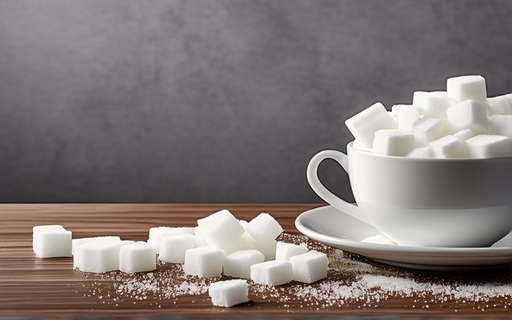Internet Asks: "Calories in Cup of Sugar"
Sugar is a staple ingredient in kitchens worldwide, a fundamental element in baking, cooking, and beverage preparation. Yet, amidst its widespread use, understanding the caloric content of sugar is crucial for those mindful of their dietary intake. This article dives into the specifics of how many calories are contained in a cup of sugar, shedding light on this sweet ingredient's energy contribution to our diets.
sponsored links

Caloric Content in Different Types of Sugar
The calorie count in a cup of sugar can vary slightly depending on the type of sugar used. Here are some common varieties:
-
- Granulated White Sugar:
- Calories: A standard cup of granulated white sugar, which weighs about 200 grams, contains approximately 774 calories.
-
- Powdered Sugar:
- Calories: Due to its finer texture, a cup of powdered sugar weighs less than granulated sugar, roughly 120 grams, equating to about 464 calories.
-
- Brown Sugar (Light or Dark):
- Calories: Packed brown sugar contains about 830 calories per cup, slightly higher than its white counterpart due to the presence of molasses.
-
- Raw Sugars (e.g., Turbinado, Demerara):
- Calories: These less processed sugars offer roughly the same caloric content as granulated white sugar, at about 774 calories per cup.
Note: The caloric values are approximate and can vary slightly based on factors like packing density.
Nutritional Facts
Sugar, irrespective of its type, is a simple carbohydrate that provides quick energy. However, it's crucial to note that:
- - Nutrients: Sugar is considered "empty calories" as it provides energy but lacks essential nutrients like vitamins, minerals, and fiber.
- - Glycemic Index: Sugar has a high glycemic index, meaning it can cause rapid spikes in blood sugar levels, which is a concern for individuals with diabetes or insulin resistance.
sponsored links
Health Considerations
The high caloric content of sugar, coupled with its lack of essential nutrients, raises concerns regarding its excessive consumption:
- - Weight Gain: Regular, high intake of sugary foods and beverages can contribute to an energy surplus, leading to weight gain and obesity.
- - Blood Sugar Levels: Sugar consumption can cause spikes in blood glucose levels, particularly concerning for individuals with diabetes or insulin resistance.
- - Dental Health: Sugars are fermentable carbohydrates, which can contribute to tooth decay when oral hygiene is inadequate.
- - Chronic Diseases: Excessive sugar intake is associated with an increased risk of heart disease, type 2 diabetes, and certain cancers.
Recommendations
Health organizations suggest moderation in sugar intake. For instance, the American Heart Association recommends:
- - Women: No more than 6 teaspoons (about 24 grams) of added sugar per day.
- - Men: No more than 9 teaspoons (about 36 grams) of added sugar per day.
Incorporating Sugar Mindfully
For those looking to enjoy sugar while maintaining a balanced diet, consider the following tips:
- - Moderation is Key: Limiting sugar intake to occasional treats can help manage overall calorie consumption.
- - Natural Sweeteners: Options like honey, maple syrup, and agave nectar, though still high in calories, contain trace nutrients and antioxidants.
- - Artificial Sweeteners: Zero-calorie sweeteners like stevia, sucralose, and aspartame can provide sweetness without the added calories, but they should be used in moderation.
Conclusion
A cup of sugar packs a hefty caloric punch, a reminder of the importance of mindful consumption. Understanding the caloric content and health implications of sugar is vital for making informed dietary choices. By considering sugar's role in your overall diet and exploring healthier alternatives, you can enjoy the sweetness of life without compromising your health goals.
sponsored links
References
1. Harvard Health Publishing. Are certain types of sugars healthier than others?. https://www.health.harvard.edu/blog/are-certain-types-of-sugars-healthier-than-others-2019052916699
2. Bon Appetit. What Is Brown Sugar—And Just How Many Kinds Are There?. https://www.bonappetit.com/story/what-is-brown-sugar
3. USDA FoodData Central. Brown sugar. https://fdc.nal.usda.gov/fdc-app.html#/food-details/468247/nutrients
4. Chelsea Sugar. Types of Sugar. https://www.chelsea.co.nz/about-sugar/types-sugar/
5. WebMD. Brown Sugar: Are There Health Benefits? https://www.webmd.com/diet/health-benefits-brown-sugar
People are also reading...
KFC Biscuit Recipe
KFC Mashed Potatoes Calories
KFC Mashed Potatoes Nutrition
How Many Calories in a KFC Famous Bowl?
See the answer to: "How Many Calories in a KFC Famous Bowl?"
How Many Calories in KFC Biscuit?
Calories in KFC Biscuite
How Many Calories in KFC Famous Bowl?
Calories in Brown Sugar
Low-Carb Options at Taco Bell
Ready to level-up?
Create meal plans 10x faster, follow up with your clients through our mobile app, and never struggle with meal planning or recipe management again.